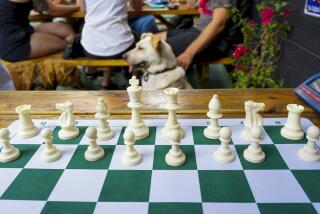Kasparov Wins Final Game, World Chess Title
- Share via
MOSCOW — Gary Kasparov scored a dramatic victory Saturday in his final game against Anatoly Karpov and became the youngest world chess champion in history at the age of 22.
The 34-year-old Karpov, who had held the title for a decade, resigned after 42 moves of the 24th and last game of their hard-fought match.
Kasparov, playing black, used his queen and a rook to check Karpov’s king in what proved to be a decisive crossfire. It gave him a 13-11 victory.
The new titleholder won five games and Karpov finished with three victories, each worth one point. Sixteen games ended in draws, worth half a point each.
Under the tournament rules, however, Karpov will be entitled to a rematch by February, and the winner must defend the title again next fall.
Congratulations to Winner
Most of the near-capacity crowd of 1,500 fans in Tchaikovsky Hall roared their approval as Karpov gave up and extended his hand to congratulate his successful challenger.
“Ga-ry! Ga-ry!” members of the audience chanted as the delighted Kasparov clasped his hands overhead in a traditional victory salute. Karpov left the stage in a hurry, without looking back.
For his supporters, Kasparov’s victory was doubly sweet, since he only needed a draw to take the match by a score of 12 1/2 to 11 1/2. It also ended Karpov’s attempts to make a comeback in the late stages of the match, when he won the 22nd game and drew two others to force a showdown in the last game.
“I think Kasparov played the final attack absolutely brilliantly,” said international grandmaster Mark Taimanov. Other experts also praised Kasparov but added that Karpov did not play his best.
Judging by the applause in the hall at the outset of the decisive game, Kasparov also was the popular favorite in Moscow, even though it is Karpov’s hometown.
Kasparov, who loves to attack, remained on the defensive for most of Saturday night’s decisive contest. Then, after sacrificing a couple of pawns, he maneuvered into striking position.
Even while risking a damaging attack on his own king, Kasparov forced Karpov to move his king out of the corner onto a square where it was vulnerable. Then, with a single move of a knight, Kasparov placed the king into check and threatened to capture a rook on the next move.
While members of the audience were on their feet, applauding and shouting, Karpov decided that his chances for victory had vanished in a few moves. He then resigned.
Kasparov’s triumph came after a total of 72 games played by the two chess titans. World Chess Federation President Florencio Campomanes called off their first match without a winner at the end of 48 games, when Karpov was ahead 5 games to 3.
Kasparov said at the time that the intervention favored Karpov, who had lost two consecutive games and was showing signs of strain from the marathon five-month encounter. Karpov, however, insisted he could continue.
Experts said that Kasparov’s aggressive style of play, which contrasted with Karpov’s emphasis on dogged defense, may influence chess tactics around the world.
Kasparov shuns conservative strategies and often sacrifices a pawn for better position instead of worrying about “equalizing” the loss of material.
His victory may also shake up the Soviet chess establishment, which seemed to favor Karpov, who had reigned for a decade after inheriting the title from defaulting American champion Bobby Fischer in 1974.
The austere and slightly built Karpov, who has a high-pitched voice and likes to collect stamps, is a notable contrast to the husky Kasparov, who swims, jogs and plays soccer.
Party Member at 19
Kasparov, half Jewish and half Armenian, was born in Baku in the republic of Azerbaijan in the southern part of the Soviet Union. He was born Gary Weinshtein, but his mother changed their name to a Russian version of her maiden name, Kasparian, after Gary’s father died.
While he is outspoken and impulsive, Kasparov is hardly a dissident. He became a Communist Party member at the age of 19 and is active in the Young Communist League.
And Kasparov readily acknowledges his chess weaknesses.
“I’m impulsive,” he told a West German interviewer. “My capacity to stay calm is underdeveloped.” The swift conclusion of the game left some spectators puzzled.
“A fantastic game,” said a young chess buff. “The whole game looked bad for Kasparov, but at the end, he won. I don’t understand what happened to Karpov.”
Karpov was not without winning chances. He had a rook in position to force a check on Kasparov’s cornered king and win a rook and bishop without any loss himself. But the challenger never gave him a chance to move that rook.
Marat Gramov, the head of the Soviet Sports Committee, noted one undeniable outcome:
“The main thing is that the championship stays in the Soviet Union.”
Here are the moves of the final game:
Karpov-Kasparov 24: 1 e4 c5 2 nf3 d6 3 d4 c:d4 4 n:d4 nf6 5 nc3 a6 6 be2 e6 7 o-o be7 8 f4 o-o 9 kh1 qc7 10 a4 nc6 11 be3 re8 12 bf3 rb8 13 qd2 bd7 14 nb3 b6 15 g4 bc8 16 g5 nd7 17 qf2 bf8 18 bg2 bb7 19 rad1 g6 20 bc1 rbc8 21 rd3 nb4 22 rh3 bg7 23 be3 re7 24 kg1 rce8 25 rd1 f5 26 g:f6 E.P. n:fd6 27 rg3 rf7 28 b:b6 qb8 29 be3 nh5 30 rg4 nf6 31 rh4 g5 32 f:g5 ng4 33 qd2 n:e3 34 q:e3 n:c2 35 qb6 ba8 36 r:d6 rb7 37 q:a6 r:b3 38 r:e6 r:b2 39 qc4 kh8 40 e5 qa7ch 41 kh b:g2ch 42 k:g2 nd4ch Karpov resigns
More to Read
Sign up for Essential California
The most important California stories and recommendations in your inbox every morning.
You may occasionally receive promotional content from the Los Angeles Times.











